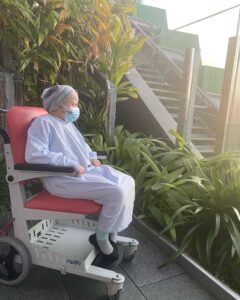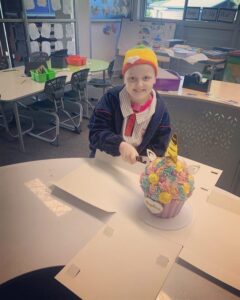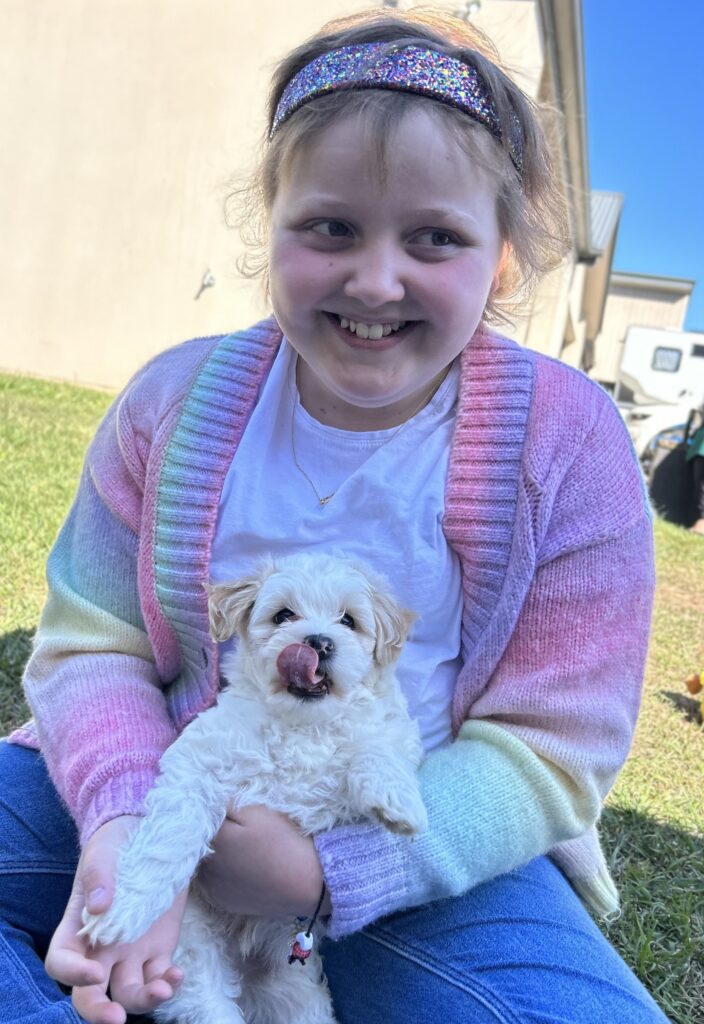At just 12 years old, Sophia has experienced more medical issues than most of us will face in a lifetime. Like many who have survived cancer, her journey hasn’t been straightforward.
Diagnosed with ‘Ewing’s sarcoma’ at 9, Sophia went through 6 rounds of chemo, had surgery that removed large parts of her ribs and back muscle and caused her to lose function of a large part of a lung. She then did 11 more rounds of chemo and 30 rounds of radiation. A few months into her remission, she was diagnosed with chemotherapy-induced leukemia. The treatment? More intensive chemo, followed by a bone marrow replacement. Now, although she is in remission, Sophia lives with fibrosis of the lung, which was also treatment-induced.
But, when you speak with Sophia, you realise that, in their innocence, children are capable of incredible resilience. While parents struggle with the depths of uncertainty a child’s cancer diagnosis brings, kids are profoundly different.
We sat down with Sophia and her mum Anneke to talk about what going through cancer is like for a girl like Sophia, who can’t help but find the tiny positives in just about anything.
How did you find out that Sophia had cancer?
A: It came out of nowhere. She’d jumped off the bed one morning and hurt her ribs. Later that night, her ribs still hurt, and she got worse very quickly, so we took her to hospital. At first, the doctors thought it could be kidney stones or pneumonia. But, after they did a CT scan, they said, “It’s got fluid around it, but it’s a mass. We’re going to refer you to oncology.”
I was really worried, because I have a pathology background. I thought, ‘There’s a cancer that breaks bones’, then I said to myself, ‘That’s a stupid thing to think, don’t think that.’
When they told us she had a tumor, my husband didn’t realise it was cancer, because the doctor said ‘mass’, but he never said the word ‘cancer’.
A biopsy revealed it was a 9 ½ cm Ewing sarcoma in the middle of her lung, and it wasn’t a ball, it had tendrils. Nobody expects a cancer to explode in their kid’s lung, but it was cancer I had first thought about.
S: I imagine it being a slimy black ball with an angry face. I named it Dingus because it’s a dingus.
A: The doctor said, “It’s a big one we’ve got to hit it now, we’ve got to start chemo this afternoon.” So, they started her on the hydration for chemo that afternoon, and she had her first round over Christmas.
Do you remember the day you first went to hospital?
S: Yeah, I fell asleep in the ambulance, so did my dad. They said daddy snores.
A: The paramedics told the hospital staff, “Just so you know, if he falls asleep it’s going to sound like he’s dying, but we checked and he’s not.”
Chemotherapy is really hard, was there anything that stands out to you from when you had your treatment?
S: I don’t have any memories of starting the treatment. I remember after my surgery that I felt really itchy.
A: I’ve had adult family members go through treatment, the real difference I noticed is how intense the kids’ therapy is compared to adult therapy. The length of it, the way they hit it, how hard they go, they use these drugs that are quite old because there’s not a lot of research compared to the adult realm. I really loved our doctors, they’re doing the best with what they have access to, but the drugs cause a lot of problems, and a lot of kids have serious aftereffects.
And she got admitted a few times throughout her treatments because she had low counts and her central line got infected. She’s had over 100 blood transfusions – there were times when she had so many transfusions I was like, “It’s almost like that’s not even your blood anymore!” She had to get weekly platelet transfusions after radiation.
S: I asked, “Can I die from it? From low platelets?”
A: And I said, “Yes! So, stop jumping off things and getting bruises!”

You went into remission, but then you got a different type of cancer. Do you remember what it was like when they told you that you had cancer again?
S: I had a feeling they would tell me I had cancer again! I remember they put my little brother with my grandparents. And they brought me into the kitchen, they had donuts. Then one of them said, “Ok, look you have another cancer.” And I just rolled my eyes.
A: We told her on Sunday night, we didn’t want her to have a crap weekend. She looked really annoyed, not sad. She said, “Am I going to have more time off school?” We’d just been given the all-clear less than a month ago, and she’d been back at school for four weeks.
What was it like spending Christmas in hospital?
S: They gave us these calendar things, and we’d get a present every day. And I got an iPad! It was dropped at the door. and I thought it was books at first, but it said ‘Pro’ on the side, and I had to ask daddy what it was.
A: My husband actually checked that it was meant for her. We were blown away, a boy named Luke, who was diagnosed with an aggressive form of cancer, gave iPads to oncology kids over Christmas. It was so helpful to us; I don’t know how we would have gotten through without it.
Do you remember anything else from the second time you had treatment for cancer?
S: I didn’t like PEG [Pegfilgrastim], it’s this giant needle that goes into your leg.
A: After her bone marrow transplant, Sophia had to have it every day to try and stimulate the cells to make bone marrow again. It’s really painful.
Overall, what do you think was the most challenging part of your cancer journey?
A: Sophia was in hospital for over 250 nights during treatment, and that doesn’t count the day clinics.
S: I missed the whole of year 4 and the whole of year 5. I don’t like that I missed out on so much learning and socializing. When I would text my friends in hospital, they would use the word ‘U’ for you and ‘R’ for are, and I would type the whole words. I felt like a grandma texting.
When I came back to school sometimes, I wouldn’t know things like the slang that kids have, or they would just talk about capybaras. And I was like, what? Why? 
But I do get a lot of perks. At Australia’s Biggest Morning Tea, people brought in cupcakes, and I got the first cupcake. I was like, a special guest – that’s a perk.
A: After 4 weeks, she went into remission. But we were told if she didn’t have a bone marrow transplant it was guaranteed she would relapse. So, for 6-7 weeks we went into hospital for the transplant.
That was her last treatment, she got through that… but she’s had lung issues since then due to the chemo, which have turned into lung fibrosis.
Now that you’re in remission, are there things you miss out on?
A: She’s only got about 40% lung capacity, but you can’t actually tell. She’s dealt with it really well.
S: I don’t remember what it’s like to breath 100%. The most annoying thing is that I can’t go on the monkey bars because I can’t hold myself up. And I can’t do clarinet anymore.
A: Little things like getting up from the ground, putting on her backpack, she can’t do them.
S: I remember my friends would help me carry my backpack when I was going home. And I don’t have to do PE sometimes if I don’t want to. That’s a perk!
Are there things people say to you at school that bother you?
S: Not really, I don’t mind talking about it, but nobody even asks me about cancer anymore. I don’t like it when people tell me I’m tough or brave though, because I already know that.
What are you looking forward to for the year to come?
S: I want to go to school because it’s high school and I’ve never been to high school.
A: Sophia always has this talent where she can find the one good thing in a crap situation. If she has to stay at hospital she’ll say, “At least they have good food tonight,” or “At least we’re in a good room.’”
S: It’s easy to find the good thing.

Researchers at Cancer Council Queensland estimate 16 Australian children under the age of 15 are diagnosed with cancer every week. As they become adults, up to 80% of the children who survive their cancer will face life-altering long-term side effects from cancer or its treatment, including secondary cancers, infertility, and disability.
While these side effects are severely under researched, a new Cancer Council Queensland research project aims to shine light on the true cost of childhood cancer. The groundbreaking Late Effects of Childhood Cancer (LACE) project, which is the first of its kind, will analyse the data of over 24,500 Australian children who have been diagnosed with cancer between 1983 and 2021. LACE aims to give policymakers the missing piece of the puzzle, providing them with the information they need to better support survivors, including Sophia, throughout their lives.

